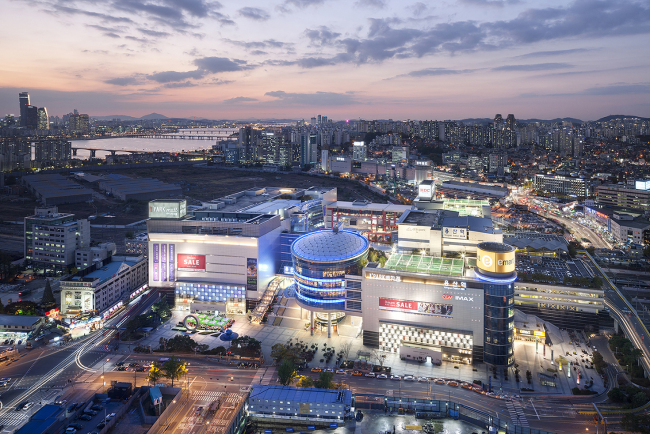Hyundai Development and Hotel Shilla’s announcement on Sunday to join forces to win a license for an urban duty-free store in Seoul has spurred fresh competition among domestic retailers to grab their share of the 3.2 trillion won ($3 billion) urban duty-free industry.
The bidding, managed by the Korea Customs Service, will start in June, with two out of three slots in Seoul allocated to large enterprises and the last reserved for a small- to mid-sized firm. But the “war,” in particular among retail giants, has already started.
According to Seoul Economic Daily newspaper, Hanwha Galleria, which launched its duty-free operations at Jeju International Airport last year, is considering housing a duty-free store in Hanwha’s iconic 63 City skyscraper or the Plaza Hotel in downtown Seoul. The company, which also runs the high-end Galleria Department Store in southern Seoul, has declared duty-free as its new growth engine.
 |
| Seoul I’Park Mall in Yongsan, central Seoul. (Hyundai Development) |
Shinsegae, which advanced into the industry by acquiring Paradise DFS in 2012 and won the Incheon International Airport bid earlier this year, is reportedly eyeing Westin Chosun Hotel and Shinsegae department store’s Gangnam and Myeong-dong branches as locations for its duty-free store. SK, which already runs one urban outlet at the Sheraton Grande Walkerhill hotel in eastern Seoul, is also seeking a spot in the trendy Shinchon and Hongdae districts.
Hyundai Department Store, run by Hyundai Development chairman Chung Mong-gyu’s nephew Chung Ji-sun, on Thursday announced that the company’s lucrative department store in Samseong-dong, southern Seoul, will house the company’s duty-free store.
“We still have time left until June and are studying all possibilities,” a spokeswoman for a duty-free store told The Korea Herald. “But it is true that Shilla and Hyundai have tightened the race,” she added.
Their moves became clear after Hyundai Development and Hotel Shilla on Sunday revealed their plans to establish a joint venture, HDC Shilla DFS. This JV will run a duty-free store at the Seoul I’Park Mall in Yongsan, central Seoul, once it wins the license, the companies said.
The 12,000-square-meter store will be the fruit of Hyundai’s real estate development capability ― Yongsan I’Park Mall is known to be a very prestigious spot due to its good transport network of railways, subway and buses ― and Shilla’s ample experience of successfully running both airport and urban duty-free stores as the industry’s No.2 following Lotte. Hotel Shilla saw a record-breaking 2.9 trillion won ($2.7 billion) in sales in 2014, mostly from the DFS business.
Analysts have praised the “unlikely marriage” as a win-win strategy.
“In the actual assessment, Shilla will make up for Hyundai’s lack of operation experience in the duty-free business. As Hyundai is a newcomer it will dilute antipathy toward Shilla’s market-dominant image. The authorities have on many occasions expressed willingness to bring diversity in market players and Shilla may not win the bidding if applied solely,” an insider said.
Korea’s duty-free retail market marked 8.6 trillion won in 2014, with 3.2 trillion won generated from urban duty-free stores. But because airport duty-free stores have to pay expensive rents to the airport authorities, outlets in the city center are considered more profitable.
Observers are giving rosy forecasts. The Korea Tourism Organization predicted the number of foreigners visiting Korea to mark 18.7 million in 2018, up from less than 14 million in 2014. The biggest group, or 35 percent, has been Chinese, spending an average of $2,272 per person in Korea.
“Urban duty-free stores have been regarded as a cash cow for the retailers amid stale business records from traditional channels such as department stores, discount stores and others. The competition will be fiercer than expected,” another insider toled The Korea Herald.
By Bae Ji-sook (baejisook@heraldcorp.com)

